Are you planning to take your RV or trailer out for a dry camping trip? If so, then you’ll need to be extra careful with your battery power. Here are some tips on managing your battery power when dry camping so you can enjoy a stress-free vacation.
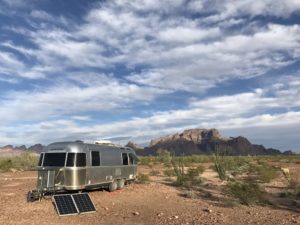
RV rental marketplaces Outdoorsy and RV Share both allow boondocking and dry camping.
Renting an RV is an exciting way to explore the great outdoors. While boondocking and dry camping are allowed with rental platforms like Outdoorsy and RV Share, you still need to clear your intentions with the RV owner who has the final say before you take the unit into the wild or simply dry camp near a lake. Some owners do not want to rent their RVs and Trailers to Dry Campers, so beware. Unfortunately, Dry Camping can be rough on the unit if the renters are not familiar with certain processes. Such as when and how to conserve power and when to recharge batteries, etc. While this may sound daunting, as long as you follow these simple tips, there’s no reason why boondocking/dry-camping can’t be a fun and carefree experience. Note that some RV and Trailer owners prefer to provide campsite delivery specifically when renters are asking to dry camp. This enables the owner to deliver and set up their trailer exactly how they want it, and each owner tends to have preferences for how their RV or Trailer is set up and operated.
It’s important to understand if the RV or Trailer that you want to rent has a solar or a generator available to extend my time off the grid
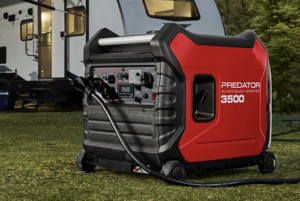
When dry camping with an RV or rental trailer, it’s important to understand the power source available to extend time off the grid. Many rentals have either a solar panel (not for quick charges) or a generator, and possibly both. If you plan to dry camp in your rental trailer with no power hook ups, then it is important to manage the battery power wisely by using only what is necessary during the nighttime – but never leaving anything that requires power on at night. Keep in mind that nearly all refrigerators are powered with propane, and most of the time, a single tank can get you through 5 days. Most rental units come with a spare propane tank. Recharging batteries during the daytime can help give you more off-grid time but it’s also wise to bring your own power banks, such as the Halo charger. Knowing if your rental is equipped with Solar and Generator is essential, and understanding the difference between an Inverter Generator and one you see at the construction site will also prevent you from being an annoyance at the campground. Reading up on your RV or Trailer rental power capabilities will help you get the most out of your experience and avoid most hiccups — and hopefully prevent you from running out of power while out on the trail.
The most significant drain on your unit’s power will be climate control. Many rigs can’t power the air conditioning from the batteries and require a generator if the temperatures call for air conditioning.
Dry camping, or camping without hook ups, is a fun experience and something every trailer enthusiast should have a go at. However, essential resources such as power must be carefully managed in order to ensure that you do not find yourself without juice halfway through the night. One of the greatest drains on power when dry camping is climate control of your rental unit; hence, heating and cooling must be used sparingly or not at all (Pro-tip: We do not recommend using climate controls when dry camping if you do not have the ability to recharge batteries and refuel generators, period). While some rigs can handle small changes in temperature with battery power alone (i.e.; ceiling fan), they are unable to sustain use of air conditioning unless powered by a generator. Also, many RV and Trailer units power the heater with propane, so it’s possible to run the heater at night, with the understanding that the heater thermostat is typically powered by the battery, so you’ll want to understand how running the heater at night depletes battery power and whether your RV or Trailer rental can sustain non-stop usage through the night.
Beyond climate, it’s helpful to bring lanterns, headlamps, and other off-grid devices that aren’t dependent on the RV’s battery.
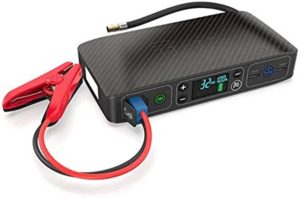
When going dry camping with your rental trailer, it’s easy to become frustrated when your battery power runs low and you don’t have any power hookups. However, beyond managing the climate in your trailer, you can bring other devices that are not dependent on the RV’s battery – like lanterns, headlamps, or a Halo Bolt Portable Phone Laptop Charger Car Jump Starter with AC Outlet. All of these devices can help reduce your use of RV battery power so that you can make the most of nighttime entertainment, like watching a movie at the end of each day or connecting digitally with friends and family back home.
Grey and Black Water Tanks have there limits, so it’s important to limit showers and washing dishes when dry camping without water and dump hook ups.
When dry camping without water and dump hookups, it’s important to limit your showers and the washing of dishes as the Grey and Black Water Tanks in your rental trailer can only fill up so much before emptying. This means you should aim to ration the use of your water during these camping trips so that it will last for the duration of your trip.
If possible, wash dishes outside using water from an alternative source and dumping the used water in an appropriate location while monitoring the water tank capacity.
When dry camping, washing dishes can become a challenge when water from a power hook-up is unavailable. However, if the option arises and safety protocols are observed, handwashing dishes outside with an alternative water source may be the most efficient solution to managing limited tank capacity. It is important that these used suds and rinse water be emptied in an appropriate place determined by local ordinances or park regulations.
Use your RV or trailer battery sparingly at night.
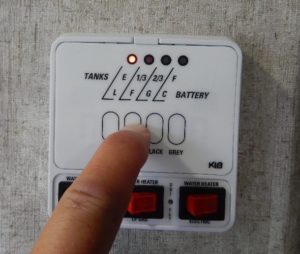 Going camping in an RV or trailer can be a great way to get away from it all and experience nature, but without a power hookup, you will need to manage your battery life carefully. This means using your trailer battery sparingly at night so you have enough power over your camping trip. To ensure that you can stay in the wild for as long as possible, turn off any lights and electronics, unplug accessories such as chargers when they are not in use, and keep appliances like TVs and microwave ovens switched off until they are needed. With careful planning and conservation of energy resources, you should have no problem maintaining your battery power throughout a camping trip.
Going camping in an RV or trailer can be a great way to get away from it all and experience nature, but without a power hookup, you will need to manage your battery life carefully. This means using your trailer battery sparingly at night so you have enough power over your camping trip. To ensure that you can stay in the wild for as long as possible, turn off any lights and electronics, unplug accessories such as chargers when they are not in use, and keep appliances like TVs and microwave ovens switched off until they are needed. With careful planning and conservation of energy resources, you should have no problem maintaining your battery power throughout a camping trip.
Recharge your batteries during the day with a generator, solar panel or by hooking up to a power source.
Keeping your RV/Trailer running while on extended trips without access to power hookups can be tricky. To make sure you have enough battery power while dry camping, you should only rent an RV or Trailer with a generator and/or solar panel, so you can keep your batteries topped off and ready to go for the night. Being aware of how much power your trailer is using and taking steps to conserve battery life at night will help alleviate any concern over needing to recharge regularly. Be aware of what devices are powered by batteries – lights, TV, laptop, etc.
Unexpected issues can arise and understanding how to respond can make or break your trip, so here are a few tips, things to know, and how you should respond.
- CO2 Alarm – most RVs and Trailers have them now and if your battery gets drained, this can trigger a reset with the device, cause it to beep at random. I’ve experienced a situation where after losing power and recharging the battery, the CO2 alarm started to Chirp. Obviously, if there is CO2 leaking in the unit i do not want to be hanging out inside by myself or with family, so if this happens to you, you’ll want to ensure that you take any CO2 alarm seriously. Start by clearing everyone out of the RV or Trailer. Then press the Test/Mute button on the alarm. If you hear a series of 4 beeps and see a flashing or solid red light on the detector (common with the Safe-T-Alert CO detectors), assume there is carbon monoxide present. However, If your alarm chirps every 30 seconds and the LED indicator light alternates between red/green, you likely have a malfunctioning alarm. In my situation, after pressing the Test/Mute button the unit did not make any noise and simply reset.
- Bathroom Fan will drain the battery – leaving the bathroom fan on throughout the night will almost always drain the battery. So if we need a fan on at night, i reccomend bringing one powered by battery.
- Powering the generator – you’ll want to learn how to fire up the generator in your RV or Trailer rental, so make sure you become familiar with the steps or sequence. That said, if you accidentally drain the battery, the generator will not start.
- Dead Battery, what do you do? – if you drain the battery you’ll be unable to power up the generator. In this case, you’ll need to locate the battery (location should have been shown to you during walk through/hand over of keys or during drop off). The easiest way to jump your battery is to use a Halo power bank with car charger. I’ve used this device to jump multiple RVs, a pontoon boat, Chevy Tahoe, and a medium-sized boat – it works. Alternatively, you can use standard jumper cables and jump the battery with the help of your car battery or a nearby camper.

How to communicate your dry camping proficiency to an owner of an RV or Trailer rental listing
Now that you know all of the do’s and don’ts of battery management when renting an RV or Trailer, articulating your new found knowledge could be the difference between getting denied or approved. For instance, there have been RVs and Trailers that I wanted to rent who listed ‘No Dry Camping’ in their profiles. But after explaining my fluent understanding of how to conserve power and the amount of grey and black water in the tanks (and other key notables), I was able to rent these units. That said, I do not recommend dry camping alone and outside of a group for your first rental unless you have owned an RV or Trailer before.
After finding the RV or Trailer you want to rent, reach out to the owner and provide the details of the Campground you intend to visit and inform them that you will be dry camping and that you know the steps/processes required to have a good time and return the unit in good working order. During this phase you can offer up the following details;
- You understand how to dry camp
- You know how to manage battery power
- You know how to conserve water usage so as to not fill up the grey and black tanks
- You understand how to only use power sparingly at night and that you will not leave anything on through the night (as this could drain the battery)
- You know that the battery needs to be recharged in the daytime and before bed or campground curfew
- Your aware that the generator needs to be refilled with gas (and that you will monitor levels)
- You know that that the refrigerator is ran off of propane and that you will check the levels of that too.
Follow my communication tips above and you should have no issue renting an RV or Trailer for your dry camping adventure. Understand that RV and Trailer owners do their best to protect their investments and may not feel comfortable approving your request if you can’t demonstrate your knowledge of how to dry camp.
Note that you do not want to book a camp site until you have been approved to rent an RV or Trailer from an owner. Once you are approved it’s time to book your camp site. Search through thousands of Camp site listings on Campspot here.
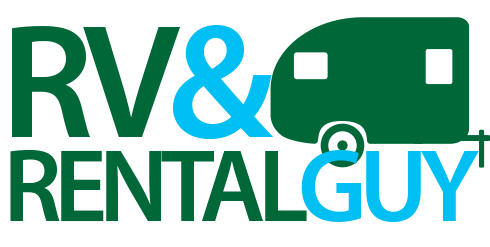
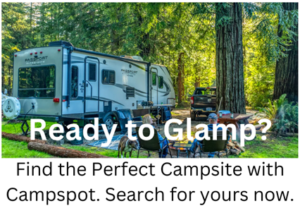
Carbon monoxide is CO, not CO2. CO2 is carbon dioxide which is not monitored nor life threatening. You might want to correct this.
Thanks